Bring 100% Customer Satisfaction – With DevOps.
Published on 26 May 2021

Bring 100% Customer Satisfaction – With DevOps.
DevOps has evolved exponentially over the decade and is grabbing the attention of every single enterprise, whether it is a well-established organization or startup. There are many reasons why businesses are widely influenced by this technology, and the most important one is customer satisfaction.
Customer satisfaction is one of the biggest challenges of the 21st-century, businesses need solutions that help them meet customers’ demand “at a faster pace” and deliver “unequalled quality”. DevOps benefits businesses by bringing transformation in the SDLC process, improving flexibility and productivity, increasing the speed of the deployment process and enhancing automation. Thus, DevOps is the solution that perfectly resonates with the current business needs.
If you believe in offering your customers the best services and giving them 100% Customer Satisfaction, maybe look at DevOps and the role it plays. Before we dig deep into it, here are a few statistics that suggest why customer satisfaction is a must for a business to bloom:
- According to the 2017 Global CX Benchmarking Report, 84% of companies reported a rise in revenue after improving customer experience.
- 91% of customers who had a bad customer experience won’t willingly do business with the same company.
- As per the Oracle survey, 77% of customers feel poor customer service experience belittle their quality of life.
Now, how does DevOps help improve customer experience?
Here are stats that can help you get an answer – according to the study conducted by Broadcom, 87% of advanced DevOps users have experienced an improvement in customer experience. Now, you must have got why businesses need to adopt DevOps.
So, let’s dive and find how DevOps benefits businesses by increasing the rate of satisfied customers:
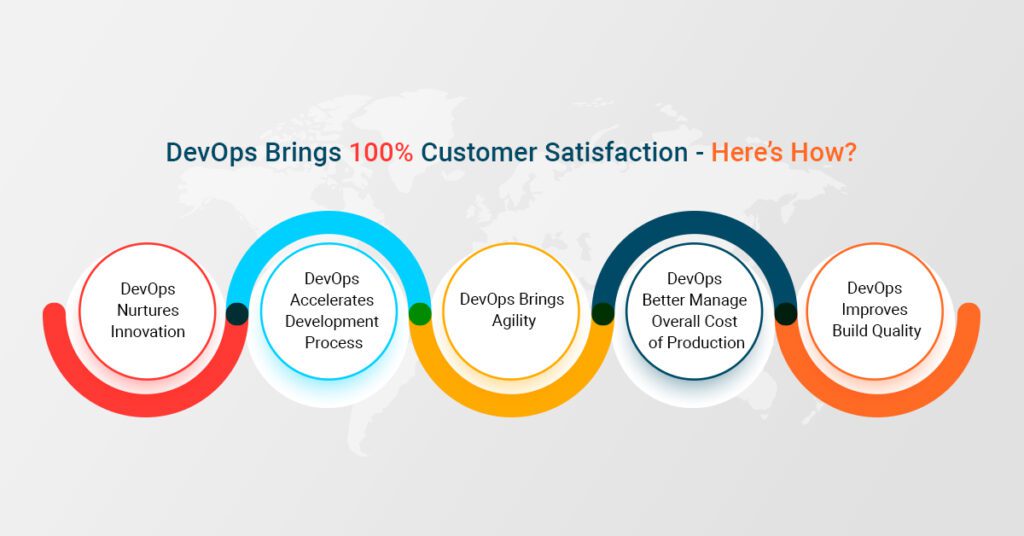
1.Devops Nurtures Innovation:
Business innovation is one of the major DevOps benefits for business that is often overlooked. Business innovation is defined as a process of brainstorming new ideas, which when implemented results in improved workflows and enhanced customer experience.
Hmm.. but how? It’s simple, DevOps streamlines different business processes which boosts productivity and hence efficiency. This leaves a lot of time for teams to bring out new ideas in their work schedule. DevOps cultivates and encourages such an environment where developers are free from repetitive tasks and have enough room to try new things. Moreover, developers can validate such ideas by performing proof of concept and proceeding according to the results without causing any disruptions to the current project.
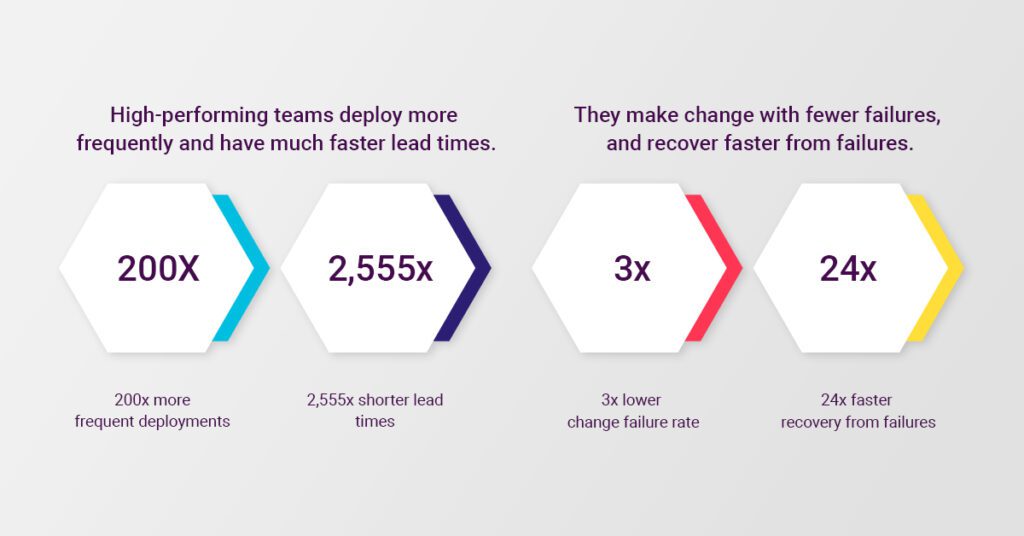
Customers crave innovation. The new and creative ideas that you apply to product development foster customer experience and bring customer satisfaction.
2. DevOps Brings Agility:
The demand of 21st-century customers is intense in terms of product complexity and time. To combat these challenges and remain ahead of their competitors, enterprises are required to infuse agility in the processes. One of the biggest benefits of adopting a DevOps culture is it brings agility.
Here, agility is more of an umbrella term that comprises various advanced capabilities. DevOps ticks all the boxes that are widely considered as crucial components for agility, thus empowering businesses to become more agile. For example, your DevOps service providers will implement such tools in your SDLC process that will help you balance the capacity as the result of demand fluctuations.
Moreover, DevOps implementation equips you with such tools that help you understand how customers use products and their overall preferences which helps in bringing further improvements to the product. Hence, boosting the number of satisfied customers. Here are 5 essential tools for DevOps adoption.
3. DevOps Improves Build Quality:
Enhanced quality is one of the biggest DevOps benefits for business. Bugs and errors in the software are the biggest threat to your application. DevOps aids in the early detection of code and also facilitates resolving the issue at a significantly faster rate, which results in improving the overall quality of software.
DevOps break down the inter-departmental silos and make communication dynamic and round-the-clock. Moreover, modular programming and iterative development result in a product that is of enhanced quality. The collaborative DevOps environment promotes a culture of sharing of knowledge across various teams associated with developing the software. And, DevOps’ continuous monitoring, continuous testing and automation of the code helps in improving the overall build quality.
How Systango Can Help You?
- We provide technical consultancy to startups, enterprises, hedge funds, and banks on how to leverage the power of technology.
- We offer an end-to-end development team for web and mobile development.
- You can hire on-demand tech resources for your development need.
Since with DevOps implementation businesses can incorporate the changes in the shorter notice, quality control measures can be implemented rigorously, resulting in enhanced user experience.
4. DevOps Accelerates Development Process:
The main principles of DevOps – continuous integration, continuous deployment, quick feedback cycle, automation – aim to increase the speed of the software development process and make it more efficient. As we know, DevOps is an evolutionary stretch of the Agile methodology, it utilizes automation thus eliminating the obstacles in the SDLC and ensuring smooth flow.
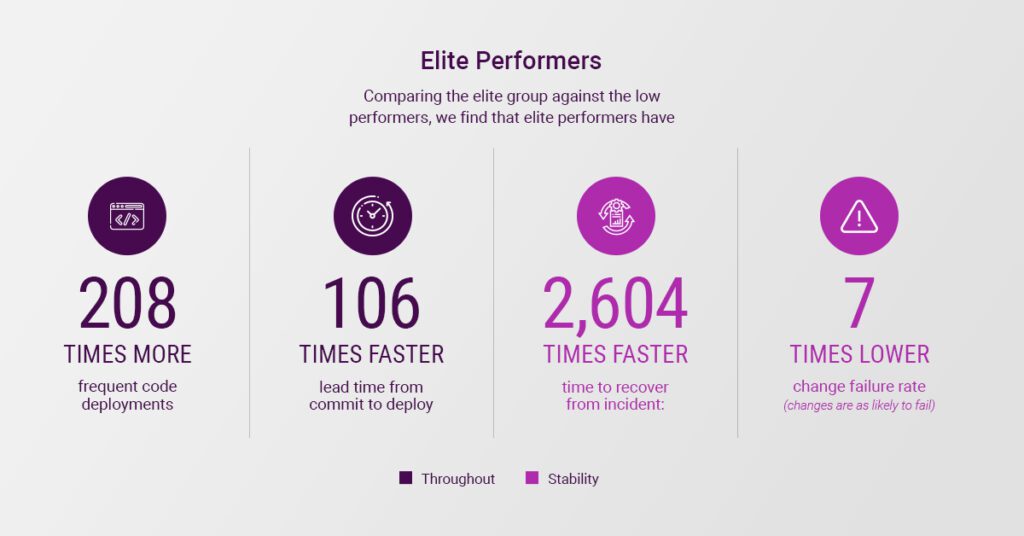
Moreover, DevOps benefits business by ensuring rapid response to customer complaints and feedback. Today’s customers expect an instant resolution to their queries and issues. If you fail in this, your customers will jump ship over to your competitors, along with leaving negative reviews about your product and company all over the Internet.
When you hire DevOps service providers, they arm your SDLC process with tools like BitBucket and GitHub for Code Management, Git and Jenkins for Continuous Integration, BlazeMeter and TSUNG for Continuous Testing etc. These tools offer the scope of quick and continuous feedback so that glitches are fixed on time and the releases are done faster. Faster product delivery cycle, quick and efficient handling of customer complaints and timely removal of defects, all contribute to improved customer experience.
5. DevOps Better Manage Overall Cost of Production:
According to the study, lessening unnecessary app development, deployment, testing and operations, results in lowering the product development cost by 25%. This allows businesses to deliver quality products at a reduced cost, thus making your customers satisfied.
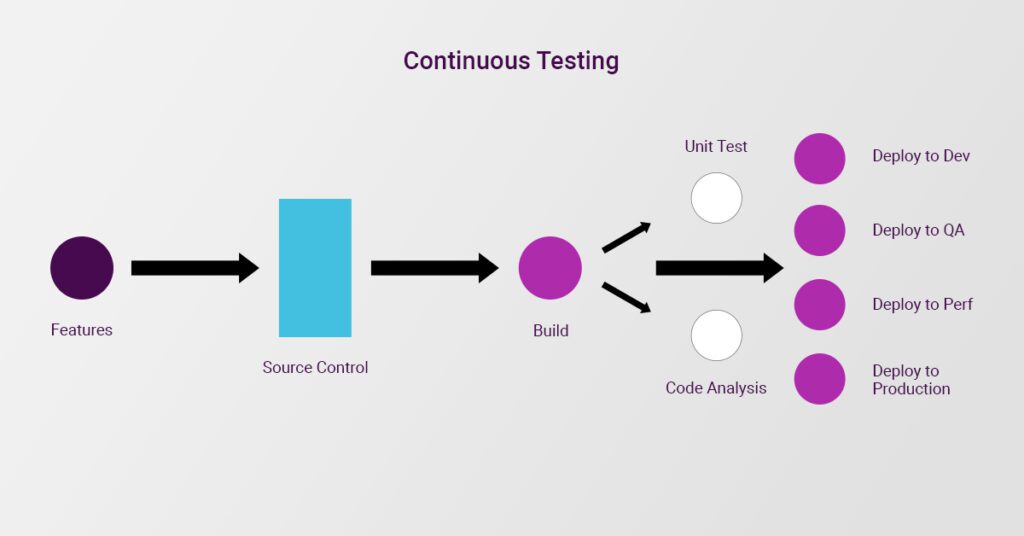
How DevOps help you manage the overall cost of production and bring products to customers at a lower price? Here is the answer:
- DevOps helps you detect the errors quickly before they cause downtime. By reducing the downtime, you can reduce the cost of the service.
- Larger software releases take a longer time to fix, DevOps lowers the change failure rate by bringing new software releases regularly.
In the end, this all comes down to customers. The more cost-effective and the more efficient services result in highly satisfied customers. In addition, to help you win 100% customer satisfaction, DevOps also reduces the abandonment rate and enhances conversion. Thus, the benefits of adopting a DevOps culture are many.
Must Read: How to hire a devops engineer: Here is all you need to know
Here, we bring you the examples of big names like Amazon and Netflix that gained immense benefits from adopting DevOps culture.
1.Amazon
Challenges Faced:
Back in 2001, Amazon followed a traditional monolithic architecture. It was a constant challenge for Amazon’s team to predict how much equipment to buy to meet the high traffic demands and determine estimates for unforeseen traffic spikes.
How DevOps helped?
Once the online retailer moved from physical servers to cloud-based Amazon Web Servers (AWS), it allowed engineers to scale capacity up or down according to the demands. Not only this reduced the expenditures on server capacity, but also propelled a transition to a continuous deployment process allowing developers to deploy their code whenever they want and to whichever server they need.
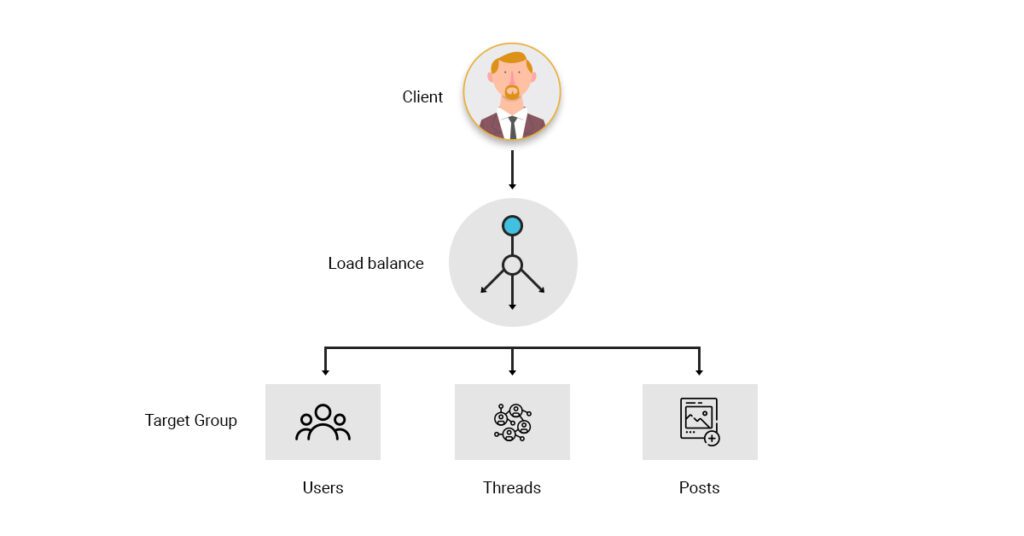
Currently, Amazon Web Services utilizes a microservices architecture as soon in the image below. In this architecture, the client makes a request, which is inspected by a load balancer. The load balancer then assigns the client request to correct the microservice. In Amazon Web Services, there are mainly three types of microservices, namely, users, posts and threads.
2. Netflix:
Challenges Faced:
Just like other organizations, Netflix too adopted the traditional monolithic architecture in the initial years. Soon, Netflix experienced a shortage of commercial tools to handle huge amounts of scale and traffic so it turned to open source solutions.
How DevOps helped?
With the help of hundreds of developer volunteers, Netflix created Simian Army, a suite of automated tools that perform stress testing of Netflix’s infrastructure and allows its engineers to proactively identify and resolve vulnerabilities before they are addressed by customers.

In 2015, Netflix was unanimously selected for the JAX Special Jury Award where JAXenter editor Coman Hamilton mentioned, “The rate at which this entertainment game-changer has adopted new technologies and implemented them into its DevOps approach is setting new standards in IT.”
3. Adobe:
Challenges Faced:
Adobe was suddenly faced with making a continuous series of small software updates rather than semi-annual releases.
How DevOps helped?
To meet with demands, Adobe moved from packaged software to a cloud services model. DevOps uses CloudMunch’s end-to-end platform to automate and fasten its deployment. CloudMunch integrates with a variety of software which allows developers to use their preferred tools, and its multi-project view allows them to see how changes done to any one of the Adobe products affect the other.
How Systango Can Help You?
- We provide technical consultancy to startups, enterprises, hedge funds, and banks on how to leverage the power of technology.
- We offer an end-to-end development team for web and mobile development.
- You can hire on-demand tech resources for your development need.
Summing Up
In the past decade, customer satisfaction has come to the forefront. With every business going digital and launching its software and apps, the demand for being competitive and delivering 100% satisfaction is at an all-time high. DevOps is not a set of practices to improve the software development process, but it is an approach that puts customer satisfaction at the centre of everything.
Being a top-notch DevOps Consultancy in London, Systango has collaborated with a number of startups, mid-level enterprises and fortune 500 companies. With us as their DevOps service providers, they have achieved 50% savings and 40% faster releases and deployments. The success of DevOps adoption is dependent a lot on the professionalism and competency of DevOps consultancy. Turn to Systango and win the game of customer satisfaction. Get in touch with our DevOps specialists today!
Related posts
DevOps
What is CI/CD- Continuous Integration and Continuous Deployment Explained
15 Jun 2021
DevOps
5 Companies That Are Nailing It With DevOps
09 Jun 2021
Let’s talk, no strings attached.
